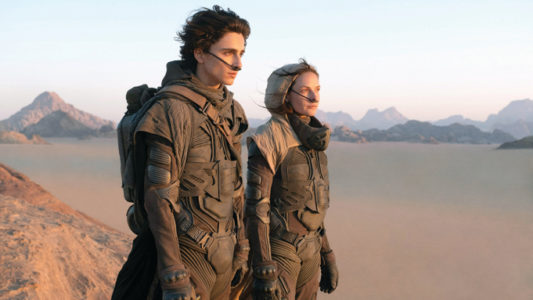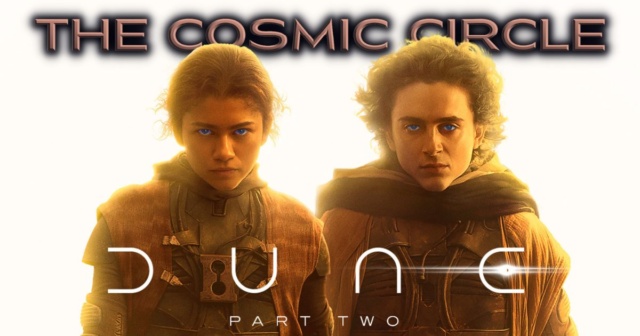‘Dune: Part Two’ Review: A Cinematic Miracle
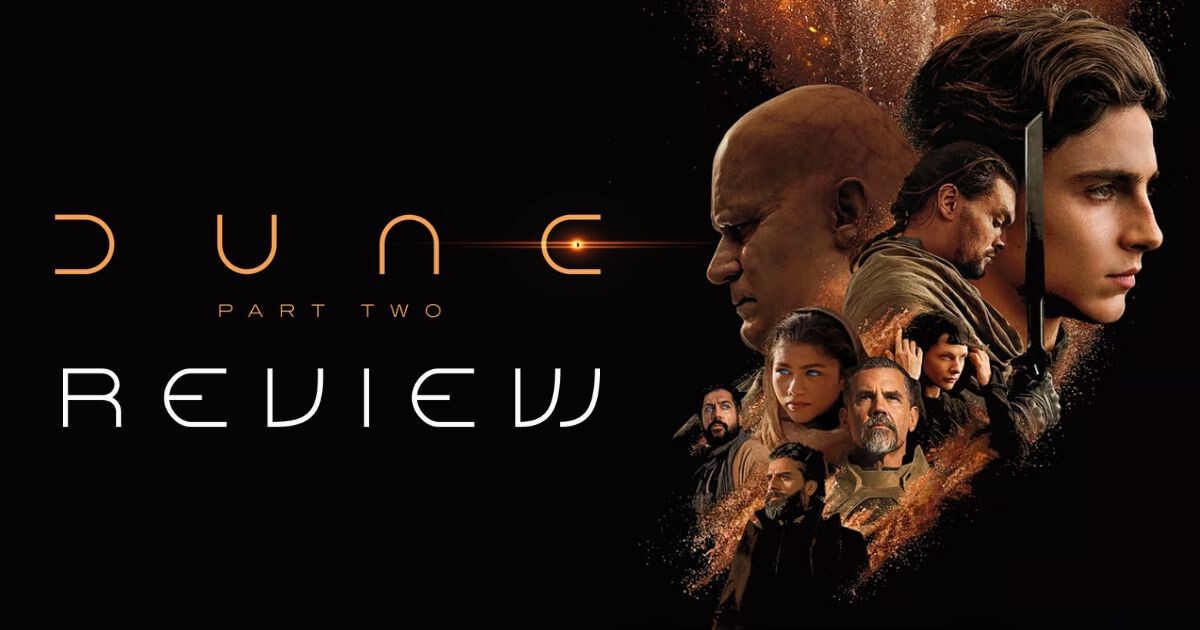
Once in a blue moon, a movie comes along that feels different. For this writer, experiences such as The Matrix or even Sam Raimi’s first Spider-Man had a quality to their execution that felt progressive in their blockbuster styles. Dune: Part Two is the first movie in a decade that feels like it is pushing the art form. We live in an era of assembly line cinema where if the movie is not tailored for commercialism perfectly, the David Zazlavs of the world want to scrap the film for a tax write-off. And in this era of petty studio decision-making, Dune: Part Two is a miracle .
Dune: Part Two is ambitious, visually spectacular, and is a masterclass adaptation. The second entry might be the best-produced sci-fi/fantasy sequel since Lord of the Rings: The Two Towers. This is stated with zero hyperbole.
Dune: Part Two: Paul Atreides and the hero’s journey
The sequel picks up right where the first one left off. Paul Atreides (Timothée Chalamet) is learning the customs and ways of Chani (Zendaya) and the Fremen. Stilgar (Javier Bardem) believes Paul might be a prophesized Messiah known as Muad’Dib, but a regional sect of the group disagrees and does not believe in old-time prophecies.
For most of the first portion of Dune: Part Two, the narrative flows like a typical hero’s journey. Paul tries to assimilate with the group and does so with surprising skill. And with each passing test, the devout believers of Muad’Dib grow more certain Paul Atreides is the chosen one. However, Paul is hesitant because of visions brought by the spice.
At the same time, Baron Harkonnen (Stellan Skarsgård) and his army have become highly aware of an uprising on the planet Arrakis as mining locations are destroyed. We finally meet Emperor Shaddam (Christopher Walken), who is informed of a rising religious figure called Muad’Dib.
The army recruits the assistance of Feyd-Rautha, a snake-like character played by Austin Butler (Elvis, Masters of the Air). He is ruthless, unmerciful, draped in pitch-black attire (like his persona), and, much like the Baron, lacks eyebrows. The Baron promises him a fortune over Arrakis if he can succeed where Glossu (Dave Bautista) has failed.
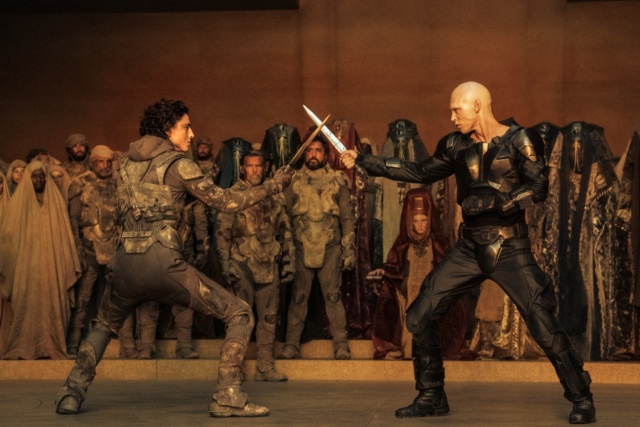
Potent themes on “saviors” in the film
From here, the story dives into the complexities of “savior worship.” One might see it as a slight on religion, but for this writer, the nuance is broader than that. Viewers can attach parallels to any icon, celeb, politician, etc. Stilgar and the Fremen are convinced Paul is the chosen one; others (including Paul) are not convinced. Lady Jessica (Paul’s mother, played by Rebecca Ferguson) quietly fans the flames on this idea of her son being Muad’Dib.
It then becomes a battle of morals for Paul, whether to embrace it or let the Fremen take back Arrakis on their own. Does embracing the prophecy increase the morale of the Fremen? Is it the right choice for the Atreides family to use a prophecy to rule Arrakis? Is the prophecy even real? Questions such as these enrich Paul’s story in the sequel. And throughout the adaptation, we can feel Paul weighing these questions as the stakes increase.
Dune: Part Two is a mind-melting visual achievement
Dune: Part Two brought back memories of the transportive experience of watching Lord of the Rings: The Two Towers on opening weekend. The visual effects, art design, and costumes are rich in detail and depth. For instance, the Baron’s army fires weapons at the Fremen from a flying craft in one scene. The camera then switches to the shooter’s perspective, giving the audience the feeling of actually flying over Arrakis. The aerial sequence is as authentic as any from Top Gun: Maverick.
Greig Fraser continues to show remarkable work here as a cinematographer. For the entirety of the film, this reviewer forgot Dune: Part Two was not photographed by Roger Deakins. Yet, every frame feels shepherded by the powers of a Deakins picture. Fraser does remarkable work here again, making the land of sand and violence feel intoxicating. Between the Dune films and The Batman, he is quickly becoming one of the landmark cinematographers of our time.
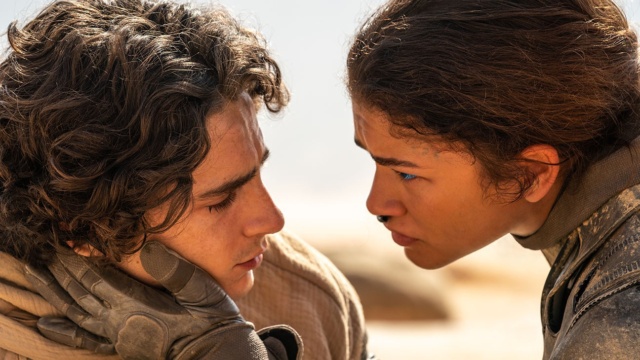
It’s the type of visual wonder that immerses the viewer in another real. Nothing about these collected pieces of sight and sound makes any sense. When one gazes at mining vehicles, warships, or any other intergalactic vehicles in the film, it looks practical, as if there is agency to what the viewer sees. When they explode, it’s photo-realistic. One might even argue. This film feels more authentic than Avatar: The Way of Water.
The sequel to Dune is the best sci-fi/fantasy follow-up since The Two Towers
Dune: Part Two is a great movie, but not without flaws. Timothée Chalamet’s acting is outstanding in the film, and he delivers some powerful moments, especially when he has to lead an army. However, at specific points in the movie, the story asks us to believe that characters like Stilgar are afraid of Paul Atreides. The idea is a stretch, as it is hard to believe that Javier Bardem’s character would be intimidated by Chalamet’s. Additionally, it’s important to remember that this is a Denis Villeneuve film, meaning the experience can sometimes become meditative or ponderous.
Despite this, the sequel to Dune is the most impressive science fiction/fantasy sequel adaptation since Lord of the Rings: The Two Towers. It’s the kind of cinematic experience that reminds us why movies are so special. Sitting in a dark theater, with a vast screen in front of you, waiting for The Battle of Helms Deep to begin, was a magical experience for this writer’s childhood in 2002. It created a feeling of wonder and spectacle that is hard to replicate at home. Dune: Part Two captures that same magic and requires an audience on the biggest (and loudest) screen possible to fully experience it.
Dune: Part Two releases in theaters on March 1, 2024. Are you planning to see it? What did you think of Part One? Let us know on social media @mycosmiccircus or in The Cosmic Circus Discord!
Dune Part One Review: An Immersive Experience Like None Other

